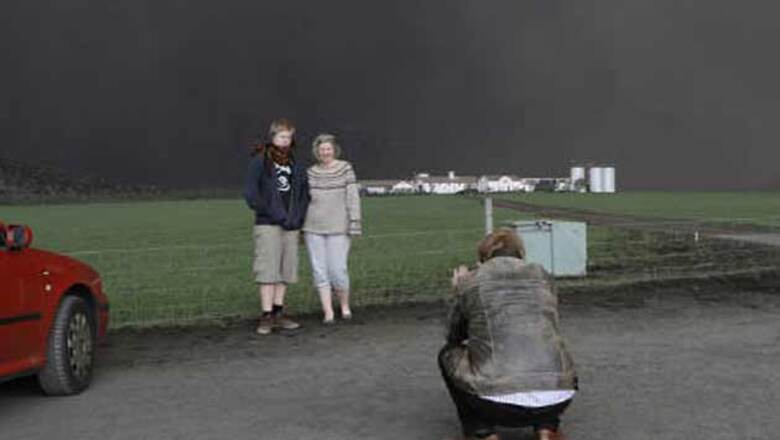
views
London: Britain's air traffic control body said on Monday it had agreed the creation of a new flying zone with Irish officials and aircraft manufacturers to limit the disruption caused by ash emitted by an Icelandic volcano.
The new "Time Limited Zone" will be put in place over UK and Irish airspace from midday on Tuesday, allowing airlines to fly through areas of medium ash density that were previously off limits, it said in a statement.
The decision followed the grounding of 1,000 flights in parts of northern Europe on Monday because prevailing winds pushed a cloud of volcanic ash from Iceland across parts of the region.
Several of Europe's busiest airports, including London's Heathrow and Schiphol in Amsterdam, were closed for several hours due to fears the ash could damage jet engines and bring down aircraft.
Eurocontrol, the European air traffic agency, said about 1,000 flights out of a total of 28,000 in Europe had been cancelled on Monday, but said the situation was improving.
Dutch airspace reopened at 1100 GMT on Monday and London's Heathrow and Gatwick airports reopened after overnight closures.
The Met Office, Britain's weather forecasting body, said southwesterly winds should push the cloud away from British and northern European airspace on Monday night and Tuesday.
The volcano, under the Eyjafjallajokull glacier in Iceland, has been erupting for weeks and shows no sign of weakening.
Last month the volcano's ash prompted a number of European countries to close their airspace for nearly a week and travel chaos ensued in Europe and beyond.
'Gross over-reaction'
British Airways Chief Executive Willie Walsh said the closure was a "gross over-reaction to a very minor risk."
"It can be managed and we don't need these blanket closures," he told reporters in London.
Dr David Rothery, of the Earth & Environmental Sciences Department at Britain's Open University, said he feared similar disruption could occur for a few days every month for the foreseeable future.
"The rate of ash eruption and the height that it reaches have both decreased over time, though now and then they temporarily re-intensify," he said in a statement.
"This is a pattern that we can expect to continue. Major disruption to air traffic is likely only when the ash column is high and the wind carries it southeastwards, so from now on I think we're looking at a few days every month."
Iceland's meteorological service said in a statement that the plume of ash was reaching an altitude of seven to nine km and geophysicist Magnus Tumi Gudmundsson of the University of Iceland said the volcano was producing ash unabated.
"Our calculations indicate that when the plume rises up to 6-7 km, the volcano is producing 150-200 tonnes (of ash) per second. When it reaches 8-9 km the production is likelier to be around 400 tonnes per second," he said on state radio.
"There are no signs of the eruption slowing down yet," he added.
Irish aviation officials said Dublin airport had reopened and the conditions looked likely to improve.
"The prospects for the next number of days are very good, we don't anticipate any problems with volcanic ash over the next two to three days," Irish Aviation Authority Chief Executive Eamonn Brennan told national broadcaster RTE's radio news.
More than 100,000 flights were cancelled across Europe last month because the volcanic ash formed a cloud over the continent. Millions of people were stranded and airlines, already battered by the global economic downturn, lost $1.7 billion, the International Air Transport Association has said.




















Comments
0 comment